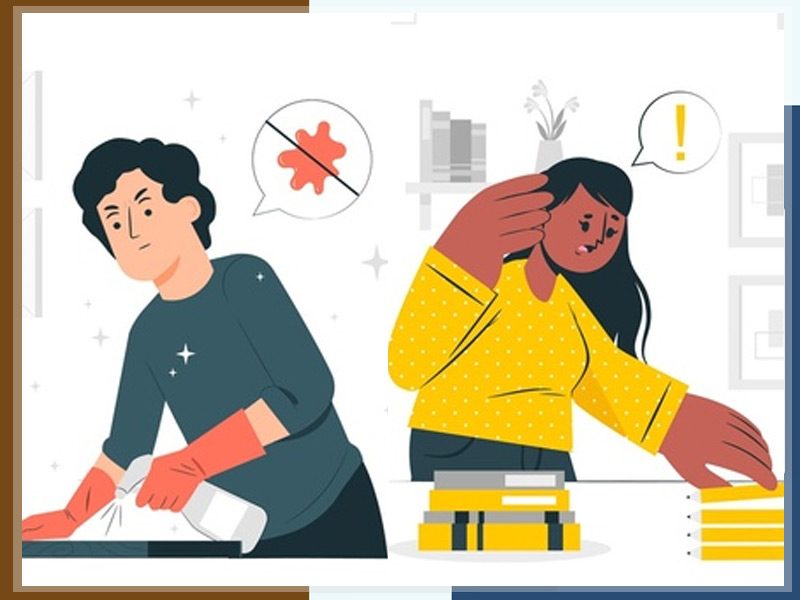
When you hear obsessive-compulsive disorder, more commonly known as OCD, the first thought that might come to your mind are things arranged in perfect symmetry and order. The second might be perfect cleanliness. Although romanticised to a certain degree by popular culture, OCD can be an exhausting and overwhelming disorder to live with. It needs proper treatment for the condition to be dealt with. However, the first step is the diagnosis, for which you must know its signs and symptoms. And to know the same, Onlymyhealth spoke to Dr Shweta Sharma, Clinical Psychologist & Founder, Mansa Global Foundation for Mental Health.
Table of Content:-
What Is Obsessive-Compulsive Disorder, Or OCD?

(Photo Credit: Freepik)
OCD is a type of anxiety disorder. As the name suggests, it has two components: obsession and compulsion. Obsessions are the repeated, unwanted thoughts or sensations caused by anxiety. And compulsion is the urge to do something over and over again to calm that anxiety down. OCD comes in many forms, Dr Sharma explained, but most cases fall into at least one of the following four general categories:
- Checking: Such as locks, alarm systems, ovens, or light switches. The person might also think of having a medical condition like pregnancy or schizophrenia.
- Contamination: The person might have fear of things being dirty, or have the compulsion to clean. Then, there is mental contamination in which the person feels he/she is treated like dirt.
- Symmetry & Ordering: The need to have things lined up in a certain way.
- Ruminations & Intrusive Thoughts: In this, there is an obsession with a line of thought. Some of these thoughts might even be violent or disturbing.
OCD: Causes

(Photo Credit: Freepik)
Learned behaviour is the main cause of OCD, along with genetic factors. This means that if you see a family member or a person from a closed environment doing repeated activities out of anxiety, you might pick up the same pattern. Then there are stressful life events, which can also result in OCD.
According to the United Kingdom’s National Health Service (NHS), other reasons behind OCD include:
- Certain personality types, such as those who are neat, meticulous, and methodical and have high personal standards. Also, people who are quite anxious in general, and have a strong sense of responsibility for themselves as well as for others are also at a greater risk of OCD.
- Also, those with OCD have areas of high activity in their brain. They also have low levels of a chemical called serotonin, which stabilises mood and induces a feeling of well-being.
Also read: 4 Types Of OCD And Their Characteristics That You Should Know About
Symptoms Of Obsessive Compulsive Disorder, Or OCD
Now coming to the question at hand, how to spot if someone has OCD. Here are some signs and symptoms that can help you identify:
- The constant fear of being contaminated by touching objects earlier touched by others. Because of this they might clean and wash their hands frequently.
- The person might have doubts if he/she has locked the door or turned off the stove and checks the same repeatedly.
- They might also have intense stress when objects aren't orderly or facing a certain way.
- They might have constant thoughts of shouting obscenities or acting inappropriately in public.
- Unpleasant sexual images followed by the feeling of guilt. The person might also become highly religious.
- Avoidance of situations that can trigger obsessions, such as shaking hands.
Also read: Obsessive Compulsive Disorder OCD: When should one seek medical advice?
So, these are some of the signs and symptoms that can help you identify if someone has OCD.
Once that is done, seeking help is extremely crucial, which can lead to prompt initiation of treatment that can help a person to better deal with the condition. However, due to the social stigma attached, many feel reluctant to seek treatment, maybe out of embarrassment, fear, or shame. Just remember, OCD is just like any other health issue that needs proper care and medical attention.
Once you decide to seek help, treatment is generally a combination of psychotherapy and medication, Dr Sharma said. Out of the two, psychotherapy is more important. It majorly includes cognitive behaviour therapy and relaxation therapies. So, this is everything you need to know about OCD and the signs that can help you identify if you or someone around you is suffering from it. Seeking treatment is the next step.
(With inputs from Dr Shweta Sharma, Clinical Psychologist & Founder, Mansa Global Foundation for Mental Health)
Photo Credit: Freepik
Also watch this video
How we keep this article up to date:
We work with experts and keep a close eye on the latest in health and wellness. Whenever there is a new research or helpful information, we update our articles with accurate and useful advice.
Current Version